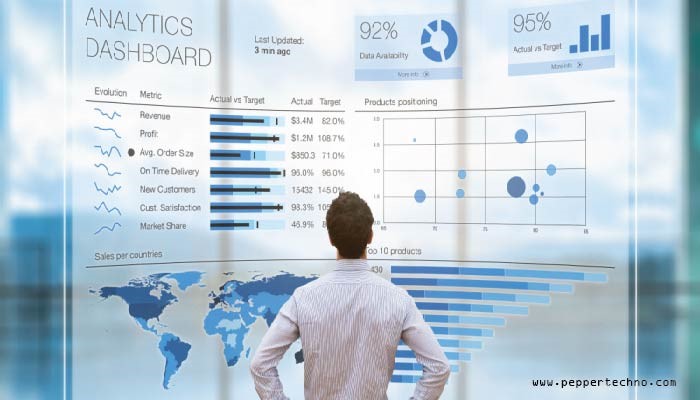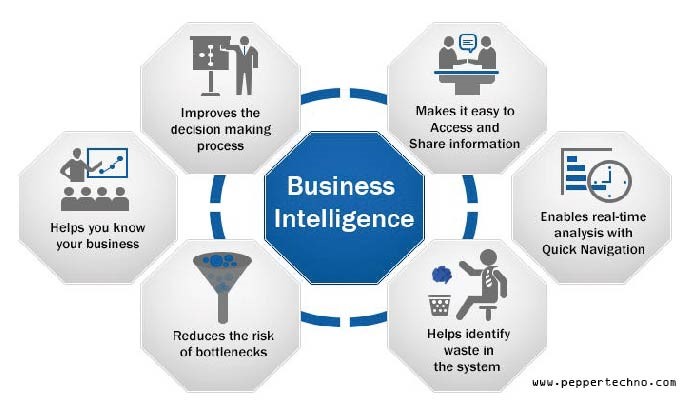What is meant for Business Intelligence Platforms?
Are you ready to unlock the power of data and take your business to new heights? Dive into the dynamic world of business intelligence platforms with us! In this blog post, we’ll explore what these platforms are all about, why they’re essential for modern businesses, their key features, and type’s available, top players in the market, and future trends that will shape the industry. Get ready to revolutionize how you make decisions and drive success with business intelligence platforms!

Defining Business Intelligence Platforms
Business intelligence platforms are powerful tools that help organizations gather, analyze, and visualize data to make informed decisions. These platforms provide a centralized hub where data from various sources is collected and transformed into valuable insights. By utilizing advanced analytics and reporting capabilities, businesses can uncover trends, patterns, and correlations within their data.
These platforms enable users to create interactive dashboards and reports that offer a comprehensive view of the organization’s performance. They allow for real-time monitoring of key metrics and KPIs, empowering decision-makers to act swiftly based on accurate information. Additionally, business intelligence platforms support data integration from multiple systems, ensuring a holistic view of the business operations.
With intuitive interfaces and user-friendly features, these platforms cater to users across all levels of technical expertise. From executives seeking high-level summaries to analysts delving deep into complex datasets – business intelligence platforms adapt to diverse user needs seamlessly.
Importance and Benefits of Business Intelligence Platforms
Business Intelligence Platforms have become indispensable tools for modern businesses looking to make informed decisions based on data-driven insights. By utilizing these platforms, companies can gain a competitive edge in the market by analyzing complex data sets efficiently and accurately.
One of the key benefits of Business Intelligence Platforms is their ability to streamline data collection and analysis processes, saving valuable time and resources for organizations. This allows for quick decision-making based on real-time information, leading to improved operational efficiency and strategic planning.
Moreover, these platforms empower businesses to visualize data through interactive dashboards and reports, making it easier for stakeholders at all levels to interpret information effectively. This not only enhances communication within the organization but also fosters a culture of data-driven decision-making.
Investing in a robust Business Intelligence Platform can significantly impact an organization’s bottom line by driving revenue growth, optimizing performance, and identifying new opportunities for business expansion.
Key Features of a Business Intelligence Platform
Business Intelligence Platforms offer a range of key features that empower businesses to make data-driven decisions. One essential feature is data visualization, which allows users to easily interpret complex data through charts, graphs, and dashboards. This visual representation simplifies the understanding of trends and patterns within the data.
Another crucial feature is interactive reporting, enabling users to customize reports based on specific metrics or KPIs. This flexibility helps in generating real-time insights tailored to individual business needs. Additionally, advanced analytics tools provide predictive and prescriptive capabilities for forecasting future trends and recommending actions for optimal outcomes.
Furthermore, self-service BI empowers non-technical users to access and analyze data independently without relying on IT support. This fosters a culture of self-sufficiency within organizations by allowing employees at all levels to explore data effortlessly.
Moreover, scalability is vital as it ensures that the platform can handle increasing amounts of data as businesses grow. Cloud-based solutions offer flexibility and cost-effectiveness by providing scalable storage options while maintaining high performance levels.
Types of Business Intelligence Platforms
When it comes to business intelligence platforms, there are different types available in the market to cater to various needs and preferences. One of the most common types is cloud-based BI platforms, which offer flexibility and scalability without the need for extensive IT resources.
Another type is self-service BI platforms, allowing users to create reports and analyze data independently without relying on IT departments. Embedded BI platforms seamlessly integrate analytics into existing applications or websites, providing real-time insights to users within their familiar interfaces.
Mobile BI platforms enable access to crucial business information on-the-go through mobile devices, ensuring that decision-makers stay informed regardless of their location. Open-source BI platforms offer customizable solutions at a lower cost compared to proprietary software, making them popular among businesses looking for budget-friendly options.
Choosing the right type of business intelligence platform depends on factors such as organizational goals, technical requirements, and user preferences. Each type has its strengths and can significantly impact how data-driven decisions are made within a company’s operations.”
Top Business Intelligence Platforms in the Market
When it comes to top business intelligence platforms in the market, there are several leading options that stand out for their robust features and capabilities. One of the most well-known platforms is Tableau, known for its user-friendly interface and powerful data visualization tools. Another popular choice is Microsoft Power BI, offering seamless integration with other Microsoft products and advanced analytics functionalities.
For those looking for a cloud-based solution, look no further than Google Data Studio. This platform allows users to create interactive reports and dashboards using data from various sources easily. Additionally, Salesforce Einstein Analytics combines AI-driven insights with CRM data for a comprehensive business intelligence solution.
Not to be overlooked is Qlik Sense, which emphasizes self-service analytics and real-time data exploration. MicroStrategy offers enterprise-level BI capabilities with mobile accessibility and scalability for large organizations.
Future Trends in Business Intelligence Platforms
As technology continues to evolve at a rapid pace, the future of business intelligence platforms is poised for exciting developments. One key trend that is anticipated to gain momentum is the integration of artificial intelligence and machine learning algorithms into BI tools. These advanced technologies will enable businesses to analyze vast amounts of data in real-time, providing deeper insights and predictive analytics.
Another emerging trend in BI platforms is the increased focus on data governance and security. With stricter regulations such as GDPR and CCPA in place, organizations are prioritizing compliance and enhancing security measures within their BI systems. This shift towards greater data protection will shape the way companies manage and utilize their information assets.
Furthermore, cloud-based BI solutions are expected to become more prevalent in the coming years. The scalability, flexibility, and cost-effectiveness of cloud platforms make them an attractive option for businesses looking to streamline their analytical processes. As more organizations embrace remote work environments, cloud-based BI tools offer seamless accessibility from anywhere in the world.
The future landscape of business intelligence platforms is set to be dynamic and innovative as technology continues to drive new possibilities for data-driven decision-making.
Conclusion
In this rapidly evolving business landscape, having the right tools to make informed decisions is crucial. Business Intelligence Platforms play a vital role in providing organizations with valuable insights that drive growth and success. By harnessing the power of data analytics, businesses can optimize their operations, identify opportunities, and stay ahead of the competition.
As technology continues to advance, we can expect Business Intelligence Platforms to become even more sophisticated and user-friendly. With AI and machine learning capabilities becoming increasingly prevalent in BI solutions, organizations will have access to real-time analytics and predictive insights like never before.
With a plethora of options available in the market today, choosing the right Business Intelligence Platform for your organization is key. Whether you opt for a self-service BI tool or an enterprise-level solution, selecting a platform that aligns with your business goals and requirements is essential.
Investing in a robust Business Intelligence Platform is not just about staying competitive – it’s about thriving in an ever-changing business environment. Embrace the power of data-driven decision-making and unlock new possibilities for your organization’s growth and success.



